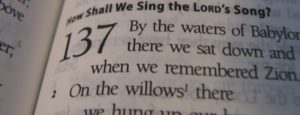Cosmic justice is a deeply Biblical idea: God will right all wrongs in this life or the next. But sometimes cosmic justice in the Bible drifts all the way into vindictive fantasies like we see in Psalm 137. It’s one of, if not the single most disturbing passage in the Bible. In it, the Hebrew author recounts their grief and the brutal pain endured at the hands of the Babylonians. The author wishes for the aggressors to experience for themselves the same level of pain that they’ve caused, thus concluding the psalm: “Happy is the one who seizes your infants and dashes them against the rocks.”
There are a lot of gruesome passages in the Bible, but infanticide is just about as bad as it gets.
The most obvious question the text raises is, “Is God really happy about the murder of babies?” Of course not. Reason and the life of Jesus are sufficient evidence otherwise. Instead, it’s a Hebrew fantasy by someone in intense pain who wants the guilty to suffer with them. We all have similar thoughts that differ only by degree.

Carrie Underwood, after a painful breakup, recorded a song named Before He Cheats singing:
“I dug my key into the side
of his pretty little souped-up four wheel drive,
carved my name into his leather seats,
I took a Louisville slugger to both headlights
Slashed a hole in all four tires
Maybe next time, he’ll think before he cheats”
Obviously Carrie Underwood didn’t actually do that in real life or she would be in jail unable to perform the song. Underwood acted out her anger in song instead of acting on it in real life. That’s a nonviolent response even when the song is about violence. Revenge ballads are popular enough to be their own sub-genre of country music.
Clearly that’s what’s going on in Psalm 137 also. They sing about something horrific instead of doing something horrific.

Douglas Adams, the author of A Hitchhikers Guide to the Galaxy, was bullied in primary school by a girl who grew up to be a poet of all things. When Adams wrote his novel, he describes a scene where an alien reads poetry so bad that the audience goes insane. The narrator tells the reader that this alien poetry is the third worst poetry in the universe, but that the worst poetry in the universe is written by Paula Nancy Millstone Jennings of Greenbridge in Essex- Adams childhood bully.
In an interview much later, Adams confessed that in reality, Paula Nancy Millstone Jennings’ poetry isn’t that bad at all. The interviewer followed up by asking if Adams regretted writing her into the book in that way. “Oh no. It was and remains immensely satisfying.” Adams claims some of his power back from his childhood bully by writing her into his fantasy fiction in a silly way.
Using art and and song and fiction to tell our stories in empowering ways and to name our anger and the depth of our wounds is a powerful, nonviolent way to begin to heal and find our voice after tragedy and trauma. Psalm 137 is great evidence that this is happening in the Bible too.

